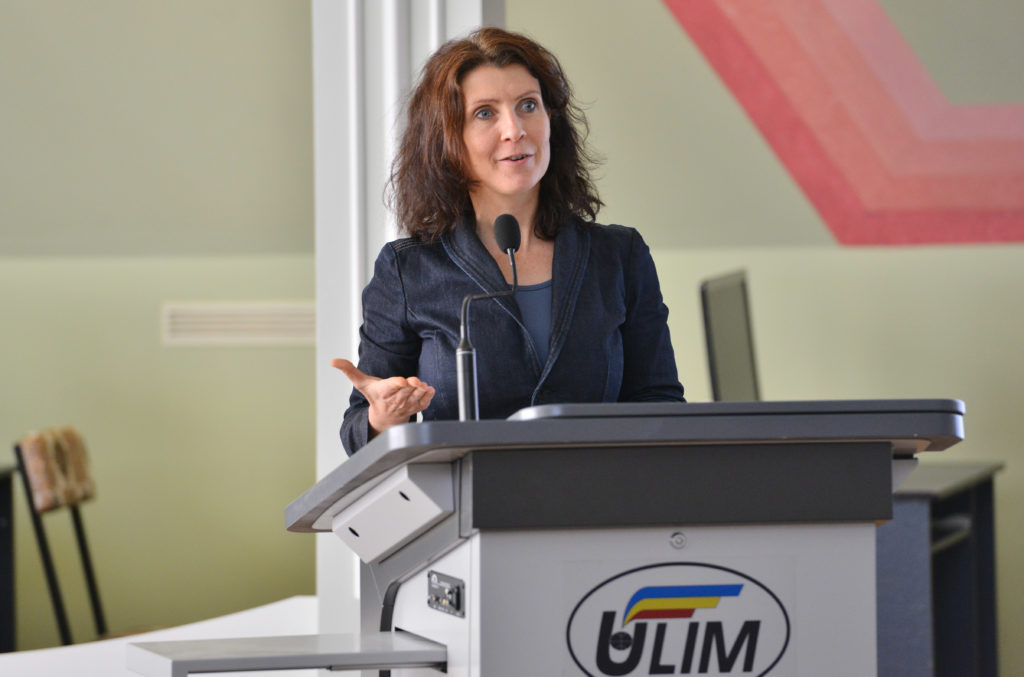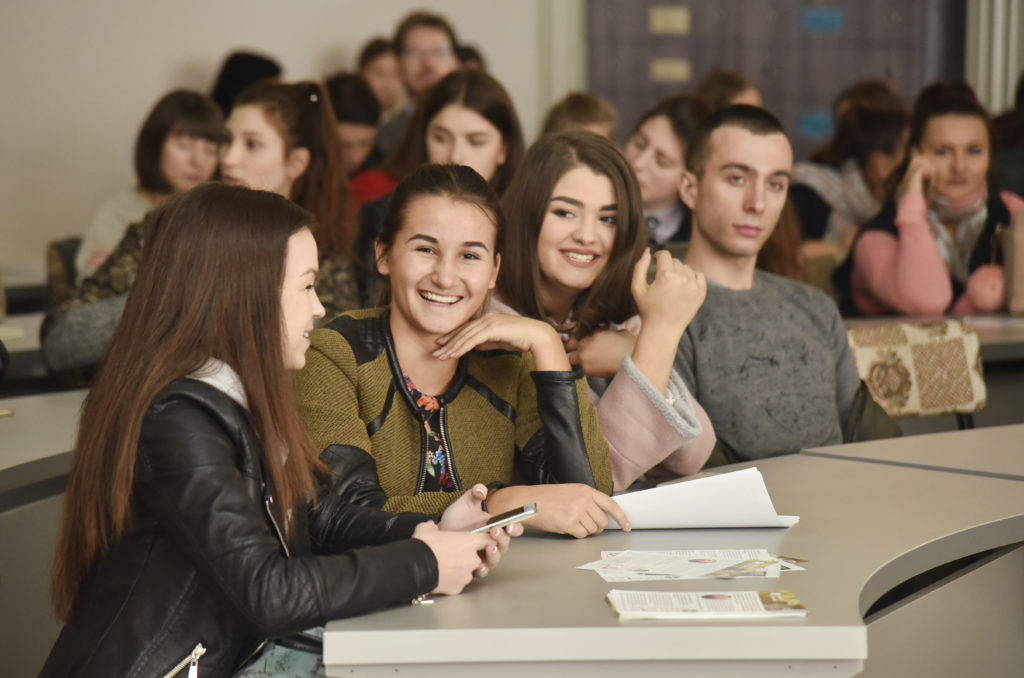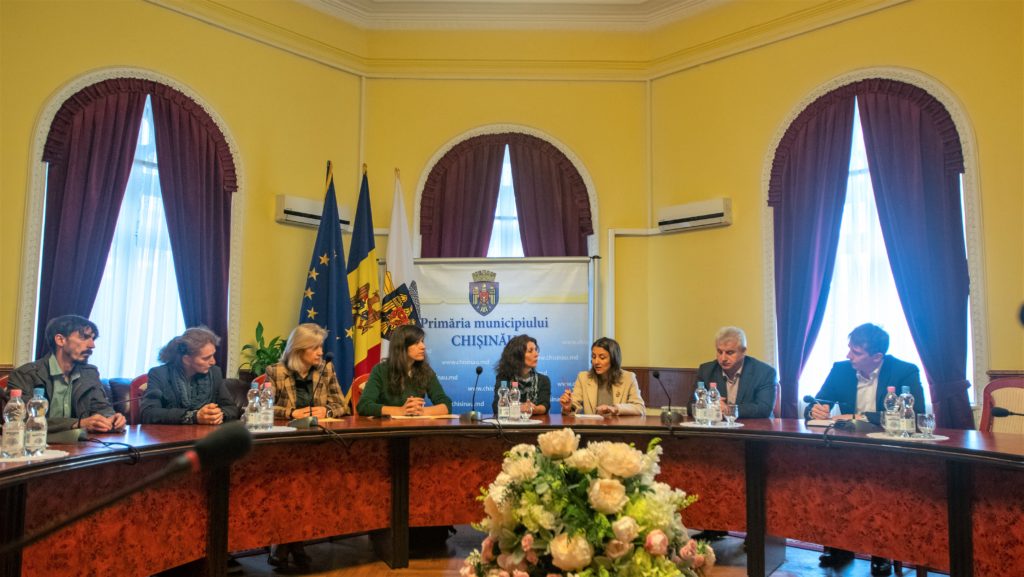Lokale Moldavische overheid belooft beter dierenwelzijnsbeleid na bezoek Nederlands Tweede Kamerlid Esther Ouwehand
Last weekend – for the first time in Moldova’s history – a lecture was given on the importance of animal rights. Dutch MP for the Party for the Animals Esther Ouwehand held the lecture at a university in the capital Chișinău, in a packed lecture hall. After that, Ouwehand talked with local animal protectionists and experts in the field of organic arable farming. The council of Chișinău promised Ouwehand that a professional centre for sterilisation and vaccination of stray animals will soon be opened.

The lecture was held at the invitation of animal rights lawyer Ion Dron. During her lecture, Esther Ouwehand pictured how the efforts made for the welfare of animal also benefit people. She showed that society needs to be more connected with nature and that it should be led by compassion.
After the lecture, Ouwehand talked with several animal protectionists, who all pointed out the lack of regulations and legislation for the protection of animals in Moldova. Lawyer Dron wrote a legislative proposal in cooperation with a Moldovan NGO, which proposal is to legally enshrine the adequate protection of animals. Animal protectionists are now fighting together for adoption of this legislative proposal by the Moldovan Parliament.
Ouwehand was impressed by the many brave people in Moldova who dare to stand up for the interests of animals. And they do so quite successfully: animal protectionists’ protests helped to close down the dolphinarium of Chișinău . Also, a first step was taken against animal abuse by making cruelty against animals punishable in the Moldovan Penal Code.
Ouwehand: “Choosing the interests of the vulnerable instead of the right of the strongest can be done close to home too. The cruel treatment of (stray) animals is not acceptable in a civilised country. And we are so happy to see that here in Moldova brave people are standing up for the interests of animals and with that for the Moldovan people themselves. Wonderful!”

Agriculture
Ouwehand praised the fact that Moldova is doing relatively well within the region in the field of organic arable farming, where nutritious crops are grown, such as walnuts, fruit, beans and sunflower pits. However, she warned for the growing lobby of foreign companies to expand industrial livestock farming in Moldova. Now that the Western livestock industry is suffering a crisis and people in the West are less tolerant of the industry destroying their living environment, it sees opportunity to move its polluting practices to Eastern-Europe.
Ouwehand: “Moldova is well capable to provide food for the future: it has fertile soils and a great variety of crops, as a result of which a natural resistance against insects and plagues can be cultivated. Agriculture without overfertilisation and pesticides, with plenty of vegetable proteins for human consumption: that is what Europe needs. We hope that Moldova will not make the same mistake as the West did and will oppose to importing Western livestock practices, as this would mean a disaster for Moldova’s nature, animals, people and the environment.
Municipal policy

Moldovan animal protectionists told Ouwehand that local governments do very little to achieve animal welfare and that they even actively participate in the cruel approach of stray animals by facilitating so-called “Killing Stations”. That is why Ouwehand, together with animal protectionists, talked with the political advisor of the Mayor of Chișinău.
The council admitted that a lot can be improved in the area of animal welfare policy. The Mayor’s advisor then promised that the council will start to conduct an animal-friendly stray animals policy soon. The first step towards this is the opening of a professional centre for the sterilisation of stray dogs, where 50 dogs can be looked after and treated according to European standards. Ouwehand told the Mayor’s advisor that she will follow the progress through the local animal welfare organisations.
During the meeting with the council, animal rights lawyer Dron again emphasised why an appropriate animal welfare policy is essential: “Animal welfare is not only important for animals, but also for the entire society. An inadequate animal welfare policy will harm our society as a whole.”
Afgelopen weekend werd voor het eerst in de geschiedenis van Moldavië een lezing gegeven over het belang van dierenrechten. Nederlands Tweede Kamerlid voor de Partij voor de Dieren, Esther Ouwehand, gaf de lezing op een universiteit in hoofdstad Chișinău, in een afgeladen collegezaal. Ouwehand sprak daarna met lokale dierenbeschermers en experts op het gebied van biologische akkerbouw. Van gemeente Chișinău kreeg Ouwehand de toezegging dat er binnenkort een professioneel centrum voor sterilisatie en vaccinatie van zwerfdieren wordt geopend.

De lezing vond plaats op uitnodiging van dierenrechtenadvocaat Ion Dron. Esther Ouwehand illustreerde tijdens haar lezing hoe de inzet voor het welzijn van dieren ook een inzet is voor mensen. Ze liet de noodzaak zien van een samenleving die meer in verbinding staat met de natuur en die geleid wordt door compassie.
Na de lezing sprak Ouwehand met verschillende dierenbeschermers, die allemaal wezen op een gebrek aan wet- en regelgeving die dieren in Moldavië beschermt. Advocaat Dron heeft in samenwerking met een Moldavische ngo een wetsvoorstel geschreven dat adequate bescherming van dieren in de wet moet verankeren. Dierenbeschermers vechten er nu samen voor dat dit wetsvoorstel door het Moldavische parlement wordt overgenomen.
Ouwehand was onder de indruk van de vele moedige mensen in Moldavië die durven op te komen voor de belangen van de dieren. En dat doen ze met succes: mede dankzij protesten van dierenbeschermers werd het dolfinarium van Chișinău gesloten. Ook is de eerste stap gezet tegen dierenmishandeling door het strafbaar stellen van wreedheid tegen dieren in het Wetboek van Strafrecht.
Ouwehand: “Kiezen voor de belangen van de kwetsbare in plaats van het recht van de sterkste kan ook dicht bij huis. De wrede omgang met (zwerf)dieren hoort niet thuis in een beschaafd land. En we zijn ontzettend blij te zien dat hier in Moldavië moedige mensen opstaan om op te komen voor de belangen van dieren en daarmee voor het Moldavische volk zelf. Geweldig!”
Landbouw
Ouwehand prees het feit dat Moldavië het in de regio relatief goed doet op het gebied van biologische akkerbouw, waarbij voedzame gewassen zoals walnoten, fruit, bonen en zonnebloempitten worden verbouwd. Ze waarschuwde echter voor de groeiende lobby van buitenlandse bedrijven om de industriële veehouderij in Moldavië uit te breiden. Nu de Westerse vee-industrie in een crisis verkeert en mensen in het Westen steeds minder tolereren dat de industrie hun leefomgeving kapotmaakt, ziet de industrie kansen om haar vervuilende praktijken te verplaatsten naar Oost-Europa.
Ouwehand: “Moldavië heeft alles in huis voor het voedsel van de toekomst: vruchtbare bodems en een grote variatie aan gewassen, waardoor een natuurlijke weerbaarheid tegen insecten en plagen kan worden gecultiveerd. Een landbouw zonder overbemesting en landbouwgif, met volop plantaardige eiwitten voor menselijke consumptie: dat is wat Europa nodig heeft. We hopen dat Moldavië niet dezelfde fouten als het Westen maakt en zich verzet tegen de import van Westerse vee-industriepraktijken, welke een ramp zouden betekenen voor de Moldavische natuur, dieren, mens en het milieu.”

Gemeentelijk beleid

Moldavische dierenbeschermers vertelden dat lokale overheden weinig doen voor dierenwelzijn en zelfs actief meewerken aan een wrede aanpak van zwerfdieren door o.a. het faciliteren van zogenaamde “Kennels des Doods”. Daarom ging Ouwehand, samen met de dierenbeschermers, in gesprek met de politiek adviseur van de burgemeester van Chișinău.
De gemeente erkent dat er nog veel te verbeteren valt op het gebied van dierenwelzijnsbeleid. Vervolgens beloofde de adviseur van de burgemeester dat de gemeente op korte termijn diervriendelijk zwerfdierenbeleid gaat voeren. De eerste stap daarnaartoe wordt de opening van een professioneel centrum voor sterilisatie van zwerfhonden, waarin 50 honden kunnen worden opgevangen en behandeld volgens Europese normen. Tevens beloofde de gemeente dat de wagens waarin de zwerfdieren worden vervoerd nog voor de opening van het centrum diervriendelijk zullen worden gemaakt door ze o.a. met goede kooien en een ventilatiesysteem uit te rusten. Ouwehand liet de adviseur van de burgemeester weten het proces te zullen volgen via de lokale dierenorganisaties.
Dierenrechtenadvocaat Dron benadrukte tijdens het gesprek met de gemeente nogmaals waarom goed dierenwelzijnsbeleid noodzakelijk is: “Dierenwelzijn is niet alleen belangrijk voor de dieren, maar ook voor de hele samenleving. Slecht dierenwelzijnsbeleid schaadt onze samenleving als geheel.”